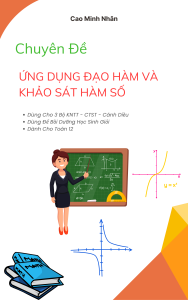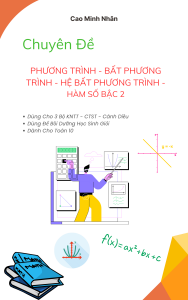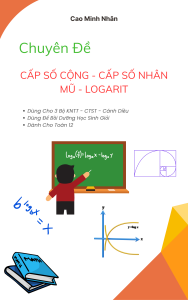Trung Tâm Luyện Thi Đại Học
Phương trình bậc hai với các hàm số lượng giác - Phần 2
B. Bài tập có hướng dẫn giải (tiếp theo)
Câu 11. Giải phương trình: \( \frac{4{{\sin }^{2}}2x+6{{\sin }^{2}}x-9-3\cos 2x}{\cos x}=0 \) (*)
Hướng dẫn giải:
Điều kiện: \( \cos x\ne 0\Leftrightarrow x\ne \frac{\pi }{2}+k\pi ,\text{ }k\in \mathbb{Z} \).
Lúc đó: (*) \( \Leftrightarrow 4{{\sin }^{2}}2x+6{{\sin }^{2}}x-9-3\cos 2x=0 \)
\( \Leftrightarrow 4(1-{{\cos }^{2}}2x)+3(1-\cos 2x)-9-3\cos 2x=0\Leftrightarrow 4{{\cos }^{2}}2x+6cos2x+2=0 \)
\( \Leftrightarrow \left[ \begin{align} & \cos 2x=-1 \\ & \cos 2x=-\frac{1}{2} \\ \end{align} \right. \) \( \Leftrightarrow \left[ \begin{align} & 2x=\pi +k2\pi \\ & 2x=\pm \frac{2\pi }{3}+k2\pi \\ \end{align} \right. \) \( \Leftrightarrow \left[ \begin{align} & x=\frac{\pi }{2}+k\pi \text{ }(\ell ) \\ & x=\pm \frac{\pi }{3}+k\pi \text{ }(n) \\ \end{align} \right. \).
Câu 12. Cho \( f(x)=\sin x+\frac{1}{3}\sin 3x+\frac{2}{5}\sin 5x \). Giải phương trình: \( {f}'(x)=0 \).
Hướng dẫn giải:
Ta có: \( {f}'(x)=\cos x+\cos 3x+2\cos 5x \)
\( {f}'(x)=0\Leftrightarrow \cos x+\cos 3x+2\cos 5x=0\Leftrightarrow (\cos x+\cos 5x)+(\cos 3x+\cos 5x)=0 \)
\( \Leftrightarrow 2\cos 3x\cos 2x+2\cos 4x\cos x=0\Leftrightarrow (4{{\cos }^{3}}x-3\cos x)\cos 2x+(2{{\cos }^{2}}2x-1)\cos x=0 \)
\( \Leftrightarrow \left[ (4{{\cos }^{2}}x-3)\cos 2x+2{{\cos }^{2}}2x-1 \right]\cos x=0 \)
\(\Leftrightarrow \left[ \left( 2(1+\cos 2x)-3 \right)\cos 2x+2{{\cos }^{2}}2x-1 \right]\cos x=0\)
\(\Leftrightarrow \left[ \begin{align} & \cos x=0 \\ & \left( 2(1+\cos 2x)-3 \right)\cos 2x+2{{\cos }^{2}}2x-1=0 \\ \end{align} \right.\) \( \Leftrightarrow \left[ \begin{align} & \cos x=0 \\ & 4{{\cos }^{2}}2x-\cos 2x-1=0 \\ \end{align} \right. \)
\( \Leftrightarrow \left[ \begin{align} & \cos x=0 \\ & \cos 2x=\frac{1\pm \sqrt{17}}{8} \\ \end{align} \right. \) \( \Leftrightarrow \left[ \begin{align} & x=\frac{\pi }{2}+k\pi \\ & 2x=\pm \arccos \left( \frac{1+\sqrt{17}}{8} \right)+k2\pi \\ & 2x=\pm \arccos \left( \frac{1-\sqrt{17}}{8} \right)+k2\pi \\ \end{align} \right. \)
\( \Leftrightarrow \left[ \begin{align} & x=\frac{\pi }{2}+k\pi \\ & x=\pm \frac{1}{2}\arccos \left( \frac{1+\sqrt{17}}{8} \right)+k\pi \\ & x=\pm \frac{1}{2}\arccos \left( \frac{1-\sqrt{17}}{8} \right)+k\pi \\ \end{align} \right.,\text{ }k\in \mathbb{Z} \).
Câu 13. Giải phương trình: \( {{\sin }^{8}}x+{{\cos }^{8}}x=\frac{17}{16}{{\cos }^{2}}2x \) (*)
Hướng dẫn giải:
Ta có: \( {{\sin }^{8}}x+{{\cos }^{8}}x={{({{\sin }^{4}}x+{{\cos }^{4}}x)}^{2}}-2{{\sin }^{4}}x{{\cos }^{4}}x \)
\( ={{\left[ {{({{\sin }^{2}}x+{{\cos }^{2}}x)}^{2}}-2{{\sin }^{2}}xco{{s}^{2}}x \right]}^{2}}-\frac{1}{8}{{\sin }^{4}}2x={{\left( 1-\frac{1}{2}{{\sin }^{2}}2x \right)}^{2}}-\frac{1}{8}{{\sin }^{4}}2x \)
\( =1-{{\sin }^{2}}2x+\frac{1}{8}{{\sin }^{4}}2x \).
Do đó: (*) \( \Leftrightarrow 6\left( 1-{{\sin }^{2}}2x+\frac{1}{8}{{\sin }^{4}}2x \right)=17(1-{{\sin }^{2}}2x) \)
\( \Leftrightarrow 2{{\sin }^{4}}2x+{{\sin }^{2}}2x-1=0\Leftrightarrow \left[ \begin{align} & {{\sin }^{2}}2x=-1\text{ }(\ell ) \\ & {{\sin }^{2}}2x=\frac{1}{2}\text{ }(n) \\ \end{align} \right. \)
\( \Leftrightarrow \frac{1}{2}(1-\cos 4x)=\frac{1}{2}\Leftrightarrow \cos 4x=0\Leftrightarrow x=\frac{\pi }{8}+\frac{k\pi }{4},\text{ }k\in \mathbb{Z} \).
Câu 14. Giải phương trình: \( \sin \frac{5x}{2}=5{{\cos }^{3}}x.sin\frac{x}{2} \) (*)
Hướng dẫn giải:
Nhận xét thấy: \( \cos \frac{x}{2}=0\Leftrightarrow x=\pi +k2\pi \Leftrightarrow \cos x=-1 \).
Thay vào (*), ta được:
\( \sin \left( \frac{5\pi }{2}+5k\pi \right)=-5\sin \left( \frac{\pi }{2}+k\pi \right) \), không thỏa \( \forall k \).
Do \( \cos \frac{x}{2} \) không là nghiệm của (*) nên ta nhân 2 vế phương trình (*) cho \( \cos \frac{x}{2}\ne 0 \):
(*) \( \Leftrightarrow \sin \frac{5x}{2}.\cos \frac{x}{2}=5{{\cos }^{2}}x.\sin \frac{x}{2}\cos \frac{x}{2} \) và \( \cos \frac{x}{2}\ne 0 \)
\( \Leftrightarrow \frac{1}{2}(\sin 3x+\sin 2x)=\frac{5}{2}{{\cos }^{3}}x.\sin x \) và \( \cos \frac{x}{2}\ne 0 \)
\( \Leftrightarrow 3\sin x-4{{\sin }^{3}}x+2\sin x\cos x=5{{\cos }^{3}}x.\sin x \) và \( \cos \frac{x}{2}\ne 0 \)
\(\Leftrightarrow \left\{ \begin{align} & \cos \frac{x}{2}\ne 0 \\ & 3-4{{\sin }^{2}}x+2\cos x=5{{\cos }^{3}}x\vee \sin \frac{x}{2}=0 \\ \end{align} \right.\)
\( \Leftrightarrow \left\{ \begin{align} & \cos \frac{x}{2}\ne 0 \\ & 5{{\cos }^{3}}x-4{{\cos }^{2}}x-2\cos x+1=0\vee \sin \frac{x}{2}=0 \\ \end{align} \right. \)
\( \Leftrightarrow \left\{ \begin{align} & \cos x\ne -1 \\ & (\cos x-1)(5{{\cos }^{2}}x+\cos x-1)=0\vee \sin \frac{x}{2}=0 \\ \end{align} \right. \)
\( \begin{cases} \cos x\ne -1\\\left[\begin{array}{l} \cos x=1 \\ \cos x=\frac{-1+\sqrt{21}}{10} \\ \cos x=\frac{-1-\sqrt{21}}{10} \end{array}\right.\end{cases} \)
\( \Leftrightarrow x=k2\pi \vee x=\pm \arccos \left( \frac{-1+\sqrt{21}}{10} \right)+k2\pi \vee x=\pm \arccos \left( \frac{-1-\sqrt{21}}{10} \right)+k2\pi \text{ }(k\in \mathbb{Z}) \).
Câu 15. Giải phương trình: \( \sin 2x(\cot x+\tan 2x)=4{{\cos }^{2}}x \) (*)
Hướng dẫn giải:
Điều kiện: \( \left\{ \begin{align} & \cos 2x\ne 0 \\ & \sin x\ne 0 \\ \end{align} \right.\) \( \Leftrightarrow \left\{ \begin{align} & \cos 2x\ne 0 \\ & \cos 2x\ne 1 \\ \end{align} \right. \).
Ta có: \( \cot x+\tan 2x=\frac{\cos x}{\sin x}+\frac{\sin 2x}{\cos 2x}=\frac{\cos 2x\cos x+\sin 2x\sin x}{\sin x\cos 2x}=\frac{\cos x}{\sin x\cos 2x} \).
Lúc đó: (*) \( \Leftrightarrow 2\sin x.\cos x\left( \frac{\cos x}{\sin x\cos 2x} \right)=4{{\cos }^{2}}x\Leftrightarrow \frac{{{\cos }^{2}}x}{\cos 2x}=2{{\cos }^{2}}x \)
\( \Leftrightarrow \frac{\frac{1}{2}(\cos 2x+1)}{\cos 2x}=2.\frac{1}{2}(\cos 2x+1)\Leftrightarrow \cos 2x+1=2\cos 2x(\cos 2x+1) \)
\( \Leftrightarrow (\cos 2x+1)(2\cos 2x-1)=0\Leftrightarrow \left[ \begin{align} & \cos 2x=-1\text{ }(n) \\ & \cos 2x=\frac{1}{2}\text{ }(n) \\ \end{align} \right. \)
\( \Leftrightarrow \left[ \begin{align} & 2x=\pi +k2\pi \\ & 2x=\pm \frac{\pi }{3}+k2\pi \\ \end{align} \right. \) \( \Leftrightarrow \left[ \begin{align} & x=\frac{\pi }{2}+k\pi \\ & x=\pm \frac{\pi }{6}+k\pi \\ \end{align} \right.,\text{ }k\in \mathbb{Z} \).
Câu 16. Giải phương trình: \( 2{{\cos }^{2}}\frac{6x}{5}+1=3\cos \frac{8x}{5} \) (*)
Hướng dẫn giải:
Ta có: (*) \( \Leftrightarrow \left( 1+\cos \frac{12x}{5} \right)+1=3\left( 2{{\cos }^{2}}\frac{4x}{5}-1 \right) \)
\( \Leftrightarrow 2+4{{\cos }^{3}}\frac{4x}{5}-3\cos \frac{4x}{5}=3\left( 2{{\cos }^{2}}\frac{4x}{5}-1 \right) \).
Đặt \( t=\cos \frac{4x}{5} \) (điều kiện \( \left| t \right|\le 1 \))
Ta có phương trình: \( 4{{t}^{3}}-3t+2=6{{t}^{2}}-3 \)
\( \Leftrightarrow 4{{t}^{3}}-6{{t}^{2}}-3t+5=0\Leftrightarrow (t-1)(4{{t}^{2}}-2t-5)=0 \)
\( \Leftrightarrow \left[ \begin{align} & t=1\text{ }(n) \\ & t=\frac{1-\sqrt{21}}{4}\text{ }(n) \\ & t=\frac{1+\sqrt{21}}{4}\text{ }(\ell ) \\ \end{align} \right. \).
+ Với \( t=\cos \frac{4x}{5}=1\Leftrightarrow \frac{4x}{5}=k2\pi \Leftrightarrow x=\frac{5k\pi }{2},\text{ }k\in \mathbb{Z} \).
+ Với \( t=\cos \frac{4x}{5}=\frac{1-\sqrt{21}}{4}\Leftrightarrow \frac{4x}{5}=\pm \arccos \left( \frac{1-\sqrt{21}}{4} \right)+h2\pi \)
\( \Leftrightarrow x=\pm \frac{5}{4}\arccos \left( \frac{1-\sqrt{21}}{4} \right)+\frac{h5\pi }{2},\text{ }h\in \mathbb{Z} \).
Câu 17. Giải phương trình: \( {{\tan }^{3}}\left( x-\frac{\pi }{4} \right)=\tan x-1 \) (*)
Hướng dẫn giải:
Đặt \( t=x-\frac{\pi }{4}\Leftrightarrow x=\frac{\pi }{4}+t \)
(*) trở thành: \( {{\tan }^{3}}t=\tan \left( \frac{\pi }{4}+t \right)-1=\frac{1+\tan t}{1-\tan t}-1 \) với \( \left\{ \begin{align} & \cos t\ne 0 \\ & \tan t\ne 1 \\ \end{align} \right. \).
\( \Leftrightarrow {{\tan }^{3}}t=\frac{2\tan t}{1-\tan t}\Leftrightarrow {{\tan }^{3}}t-{{\tan }^{4}}t=2\tan t \)
\( \Leftrightarrow \tan t({{\tan }^{3}}t-{{\tan }^{2}}t+2)=0\Leftrightarrow \tan t(\tan t+1)({{\tan }^{2}}t-2\tan t+2)=0 \)
\( \Leftrightarrow \tan t=0\vee \tan t=-1 \) (nhận)
\( \Leftrightarrow t=k\pi \vee t=-\frac{\pi }{4}+k\pi ,\text{ }k\in \mathbb{Z} \).
Vậy \( x=\frac{\pi }{4}+k\pi \vee x=k\pi ,\text{ }k\in \mathbb{Z} \).
Câu 18. Giải phương trình: \( \frac{{{\sin }^{4}}2x+{{\cos }^{4}}2x}{\tan \left( \frac{\pi }{4}-x \right)\tan \left( \frac{\pi }{4}+\pi \right)}={{\cos }^{4}}4x \) (*)
Hướng dẫn giải:
Điều kiện: \(\left\{ \begin{align} & \sin \left( \frac{\pi }{4}-x \right)\cos x\left( \frac{\pi }{4}-x \right)\ne 0 \\ & \sin \left( \frac{\pi }{4}+x \right)\cos x\left( \frac{\pi }{4}+x \right)\ne 0 \\ \end{align} \right.\)\(\Leftrightarrow \left\{ \begin{align} & \sin \left( \frac{\pi }{2}-2x \right)\ne 0 \\ & \sin \left( \frac{\pi }{2}+2x \right)\ne 0 \\ \end{align} \right.\Leftrightarrow \cos 2x\ne 0\Leftrightarrow \sin 2x\ne \pm 1\).
Do: \( \tan \left( \frac{\pi }{4}-x \right)\tan \left( \frac{\pi }{4}+x \right)=\frac{1-\tan x}{1+\tan x}.\frac{1+\tan x}{1-\tan x}=1 \).
Khi \( \cos 2x\ne 0 \) thì:
(*) \( \Leftrightarrow {{\sin }^{4}}2x+{{\cos }^{4}}2x={{\cos }^{4}}4x\Leftrightarrow 1-2{{\sin }^{2}}2xco{{s}^{2}}2x={{\cos }^{4}}4x \)
\( \Leftrightarrow 1-\frac{1}{2}si{{n}^{2}}4x={{\cos }^{4}}4x\Leftrightarrow 1-\frac{1}{2}(1-{{\cos }^{2}}4x)={{\cos }^{4}}4x \)
\( \Leftrightarrow 2{{\cos }^{4}}4x-{{\cos }^{2}}4x-1=0\Leftrightarrow \left[ \begin{align} & {{\cos }^{2}}4x=1\text{ }(n) \\ & {{\cos }^{2}}4x=-\frac{1}{2}\text{ }(\ell ) \\ \end{align} \right.\Leftrightarrow 1-{{\sin }^{2}}4x=1 \)
\( \Leftrightarrow \sin 4x=0\Leftrightarrow 2\sin 2x\cos 2x=0\Leftrightarrow \sin 2x=0\text{ }(do\text{ }\cos 2x\ne 0) \)
\( \Leftrightarrow 2x=k\pi \Leftrightarrow x=\frac{k\pi }{2},\text{ }k\in \mathbb{Z} \).
Câu 19. Giải phương trình: \( 48-\frac{1}{{{\cos }^{4}}x}-\frac{2}{{{\sin }^{2}}x}(1+\cot 2x\cot x)=0 \) (*)
Hướng dẫn giải:
Điều kiện: \( \sin 2x\ne 0 \).
Ta có: \( 1+\cot 2x\cot x=1+\frac{\cos 2x}{\sin 2x}.\frac{\cos x}{\sin x}=\frac{\sin 2x\sin x+\cos 2x\cos x}{\sin x\sin 2x} \)
\( =\frac{\cos x}{2{{\sin }^{2}}x\cos x}=\frac{1}{2{{\sin }^{2}}x}\text{ }(do\text{ }\cos x\ne 0) \).
Lúc đó (*) \( \Leftrightarrow 48-\frac{1}{{{\cos }^{4}}x}-\frac{1}{{{\sin }^{4}}x}=0\Leftrightarrow 48=\frac{1}{{{\cos }^{4}}x}+\frac{1}{{{\sin }^{4}}x}=\frac{{{\sin }^{4}}x+{{\cos }^{4}}x}{{{\sin }^{4}}x{{\cos }^{4}}x} \)
\( \Leftrightarrow 48{{\sin }^{4}}xco{{s}^{4}}x={{\sin }^{4}}x+co{{s}^{4}}x\Leftrightarrow 3{{\sin }^{4}}2x=1-2{{\sin }^{2}}xco{{s}^{2}}x \)
\( \Leftrightarrow 3{{\sin }^{4}}2x+\frac{1}{2}{{\sin }^{2}}2x-1=0\Leftrightarrow \left[ \begin{align} & {{\sin }^{2}}2x=-\frac{2}{3}\text{ }(\ell ) \\ & {{\sin }^{2}}2x=\frac{1}{2}\text{ }(n) \\ \end{align} \right. \)
\( \Leftrightarrow \frac{1}{2}(1-\cos 4x)=\frac{1}{2}\Leftrightarrow \cos 4x=0\Leftrightarrow 4x=\frac{\pi }{2}+k\pi \Leftrightarrow x=\frac{\pi }{8}+\frac{k\pi }{4},\text{ }k\in \mathbb{Z} \).
Câu 20. Giải phương trình: \( {{\sin }^{8}}x+co{{s}^{8}}x=2(si{{n}^{10}}x+{{\cos }^{10}}x)+\frac{5}{4}\cos 2x \) (*)
Hướng dẫn giải:
Ta có: (*) \( \Leftrightarrow ({{\sin }^{8}}x-2si{{n}^{10}}x)+({{\cos }^{8}}x-2{{\cos }^{10}}x)=\frac{5}{4}\cos 2x \)
\( \Leftrightarrow {{\sin }^{8}}x(1-2{{\sin }^{2}}x)-{{\cos }^{8}}x(-1+2{{\cos }^{2}}x)=\frac{5}{4}\cos 2x \)
\( \Leftrightarrow {{\sin }^{8}}x.cos2x-{{\cos }^{8}}x\cos 2x=\frac{5}{4}\cos 2x\Leftrightarrow 4\cos 2x({{\sin }^{8}}x-co{{s}^{8}}x)=5\cos 2x \)
\(\Leftrightarrow \cos 2x\left[ 4({{\sin }^{8}}x-{{\cos }^{8}}x)-5 \right]=0\Leftrightarrow \left[ \begin{align} & \cos 2x=0\begin{matrix} {} & {} & {} & (1) \\\end{matrix} \\ & 4({{\sin }^{8}}x-{{\cos }^{8}}x)=5\begin{matrix} {} & (2) \\\end{matrix} \\ \end{align} \right.\)
+ (1) \( \Leftrightarrow 2x=\frac{\pi }{2}+k\pi ,\text{ }k\in \mathbb{Z} \).
+ (2) \( \Leftrightarrow 4({{\sin }^{4}}x-co{{s}^{4}}x)({{\sin }^{4}}x+co{{s}^{4}}x)=5 \)
\(\Leftrightarrow 4({{\sin }^{2}}x-{{\cos }^{2}}x)(1-2{{\sin }^{2}}x{{\cos }^{2}}x)=5\Leftrightarrow -2\cos 2x\left( 1-\frac{1}{2}{{\sin }^{2}}2x \right)=5\)
\(\Leftrightarrow -2\cos 2x.\left[ 1-\frac{1}{2}(1-{{\cos }^{2}}2x) \right]=5\Leftrightarrow {{\cos }^{3}}2x+\cos 2x+5=0\) (vô nghiệm)
Cách khác: Ta có \( 4({{\sin }^{8}}x-co{{s}^{8}}x)=5 \) (vô nghiệm)
Vì \( ({{\sin }^{8}}x-co{{s}^{8}}x)\le 1,\forall x\Rightarrow 4({{\sin }^{8}}x-co{{s}^{8}}x)\le 4<5,\forall x \).
Các bài toán cùng chủ đề!
Các sách luyện thi do Trung tâm phát hành!
Trung Tâm Luyện Thi Đại Học được xây dựng trên WordPress









